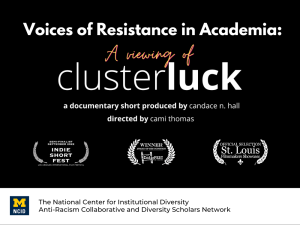Presented By: National Center for Institutional Diversity (NCID)
Voices of Resistance in Academia
A viewing of the film Clusterluck

Join us for a film screening, presentation, coffee, and cake!
According to The Education Trust (2022), the US population is becoming more diverse while university faculty remain overwhelmingly white. In fact, of the 1.5 million faculty at degree-granting postsecondary institutions assessed in the Fall 2020, 73% of faculty were white; specifically 35 percent white female and 38 percent white male (National Center for Educational Statistics, 2021). This phenomenon remains consistent when considered in relation to college student populations (Davis & Fry, 2019).
College students, especially those from minoritized backgrounds, have expressed a need for diversity in their faculty. More diverse faculty may allow these students to be “seen”, heard, and understood, which can have a positive impact on their retention and graduation rates (Curry, 2020). In addition, white students who interact with diverse faculty are more likely to develop deeper cross-cultural and critical-thinking skills and greater levels of empathy, which are essential for success in today’s multicultural and multiracial world (The Education Trust, 2022).
There is a clear need to actively work to diversify the professoriate as the the benefits of a more diverse faculty population are comprehensive among college students.
The NCID, in co-sponsorship with the Anti-Racism Collaborative and the Center for the Study of Higher and Postsecondary Education, and as a part of the 2023 Arts & Resistance Theme Semester Grant through the U-M Museum of Art and the U-M Arts Initiative, is proud to present Voices of Resistance in Academia: A viewing of the film Clusterluck. This award winning documentary highlights the journey of faculty participating in a cluster hire initiative. By exploring the journey of these faculty members as they traverse academia, we hope to offer information on how to create effective initiatives designed to diversify faculty and improve the educational experience of college student populations.
Speakers:
-Candace N. Hall, EdD, Assistant Professor at Southern Illinois University Edwardsville
-Cherese F. Fine, Assistant Professor in Educational Leadership at Southern Illinois University Edwardsville
-J.T. Snipes, PhD, Assistant Professor of Educational Leadership at Southern Illinois University at Edwardsville
According to The Education Trust (2022), the US population is becoming more diverse while university faculty remain overwhelmingly white. In fact, of the 1.5 million faculty at degree-granting postsecondary institutions assessed in the Fall 2020, 73% of faculty were white; specifically 35 percent white female and 38 percent white male (National Center for Educational Statistics, 2021). This phenomenon remains consistent when considered in relation to college student populations (Davis & Fry, 2019).
College students, especially those from minoritized backgrounds, have expressed a need for diversity in their faculty. More diverse faculty may allow these students to be “seen”, heard, and understood, which can have a positive impact on their retention and graduation rates (Curry, 2020). In addition, white students who interact with diverse faculty are more likely to develop deeper cross-cultural and critical-thinking skills and greater levels of empathy, which are essential for success in today’s multicultural and multiracial world (The Education Trust, 2022).
There is a clear need to actively work to diversify the professoriate as the the benefits of a more diverse faculty population are comprehensive among college students.
The NCID, in co-sponsorship with the Anti-Racism Collaborative and the Center for the Study of Higher and Postsecondary Education, and as a part of the 2023 Arts & Resistance Theme Semester Grant through the U-M Museum of Art and the U-M Arts Initiative, is proud to present Voices of Resistance in Academia: A viewing of the film Clusterluck. This award winning documentary highlights the journey of faculty participating in a cluster hire initiative. By exploring the journey of these faculty members as they traverse academia, we hope to offer information on how to create effective initiatives designed to diversify faculty and improve the educational experience of college student populations.
Speakers:
-Candace N. Hall, EdD, Assistant Professor at Southern Illinois University Edwardsville
-Cherese F. Fine, Assistant Professor in Educational Leadership at Southern Illinois University Edwardsville
-J.T. Snipes, PhD, Assistant Professor of Educational Leadership at Southern Illinois University at Edwardsville